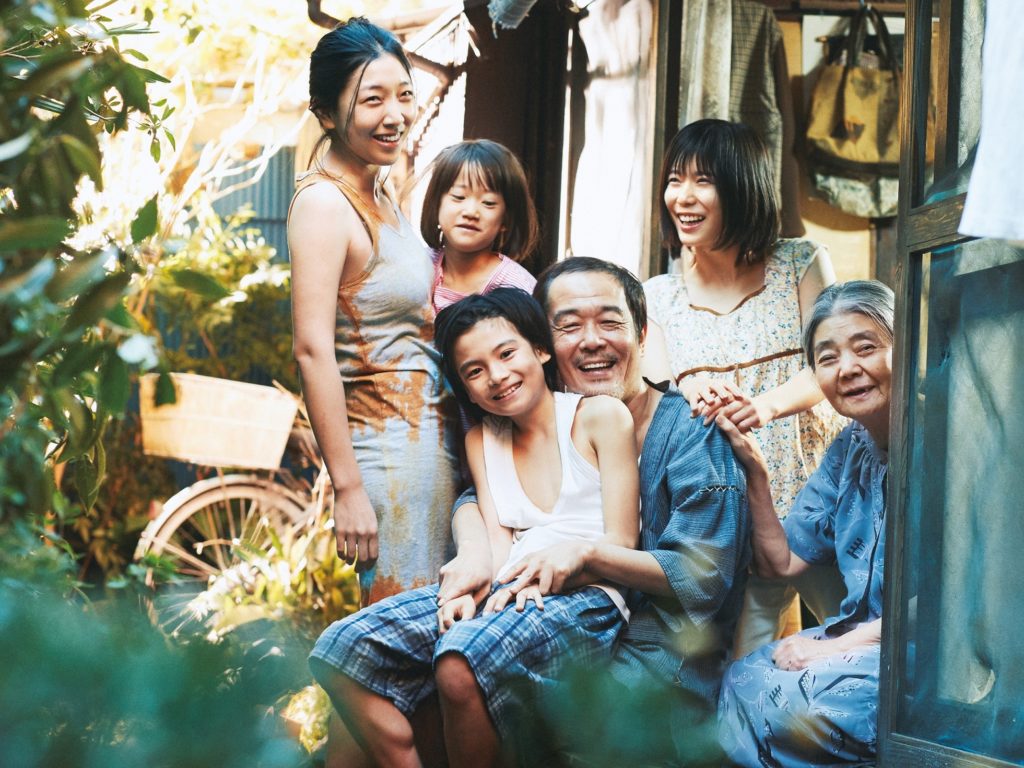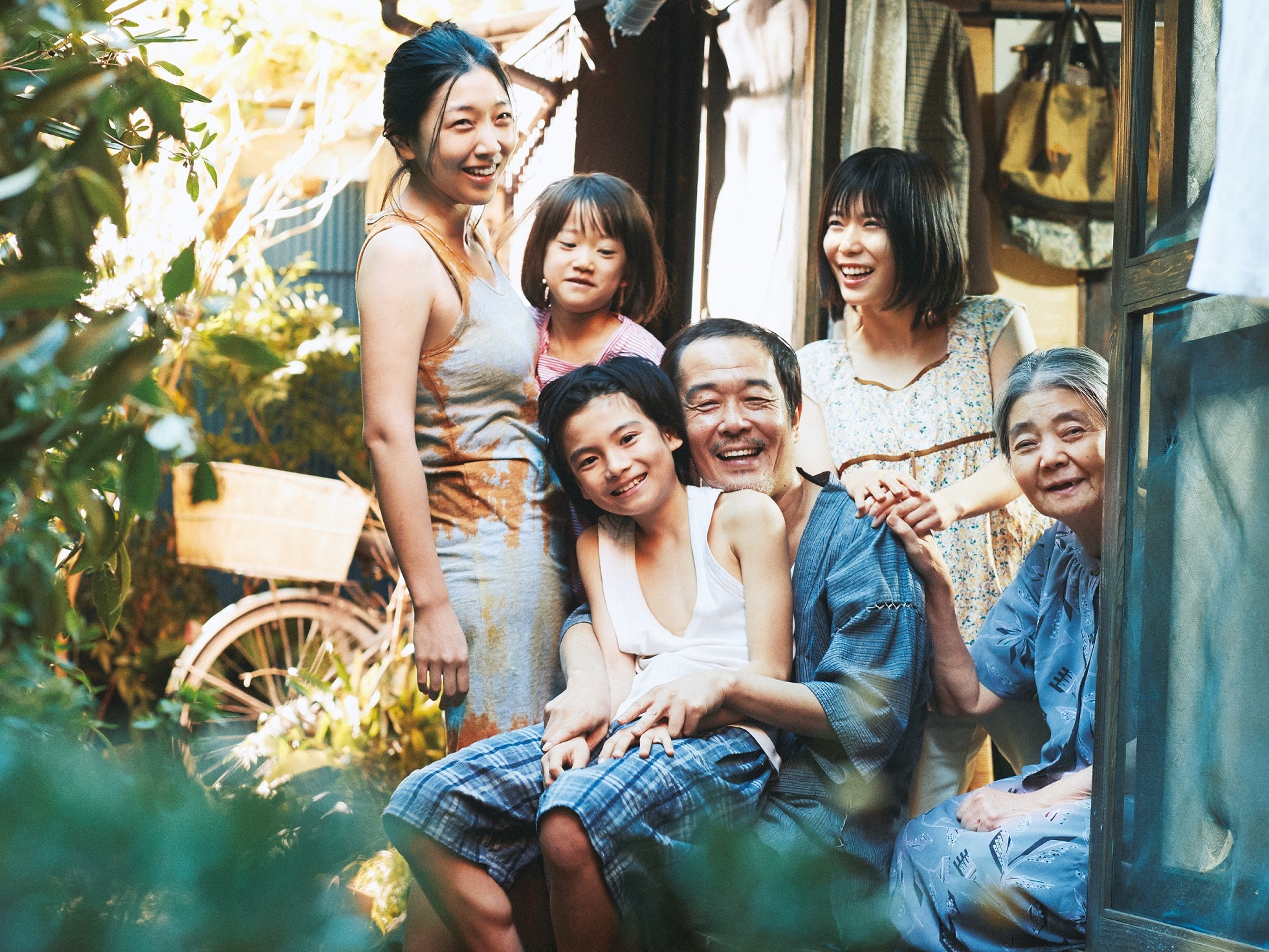『UPDATE: There will be a showing of the film with English subtitles at 7pm on June 21, at the Roppongi Hill Cinema. There will be a Q & A with the director afterwards. Details of the showing are after the review』
The titular family in “Shoplifters” give a new slant to the term “living in squalor.” (The film is partially based on true events) Their house looks more like a bizarre crime scene than an actual dwelling for normal people but – and this is a crucial point in “Shoplifters” – the family is HAPPY. They enjoy the kind of freedom that one rarely sees in Tokyo families. The 10-year old son doesn’t go to cram school (or any kind of school for that matter). The dad is not an over-worked salariman whose only solace is the company drinking party. The mom couldn’t care less about keeping up with the Tanakas. And grandma – she’s an entertaining but cantankerous piece of work who drives well-meaning social workers up the wall.

Title: The Shoplifters
©️2018 Fuji Television GAGA AOI Pro.
Distributed by GAGA
Amid the filth and debris they huddle together for warmth and comfort. At mealtimes, they poke chopsticks into ramen tubs and food cans. The catch in this cozy utopia is that they must steal almost everything they need. The other catch is that dad has just kidnapped a 5-year old girl named Yuri. She had been neglected and abused by her biological parents, so the dad just had to rescue her. “We’ll return her to her folks in the morning” he says, but then he doesn’t and Yuri joins their little clan, adding another item to their history of crime.
“Shoplifters” just won the Palme D’Or at the Cannes Film Festival – a first for a Japanese director in 21 years. The last time this happened was back in 1997, when Shohei Imamura came out with “Unagi,” and put leading man Koji Yakusho’s name on the international map. In Japan however, “Unagi” didn’t exactly break box office. It was artsy, dark and posed too many philosophical questions. While these ingredients worked wonderfully at Cannes, the general feeling in Japan was that everyone would rather watch Keanu Reeves.
“Shoplifters” is another animal. Keanu Reeves isn’t in it (too bad) but the director is Hirokazu Kore-eda: a constant contender at Cannes and other major international film festivals for the past two decades. He’s also a former TV documentarian with a shrewd sense of business. Shohei Imamura was an auteur of the old school, but Kore-eda has a nose for what sells. In his films, art never overwhelms commercialism and on the other hand, it’s not all business either. Kore-eda knows that in the international market, the biggest appeal of a Japanese film is its Japanese-ness and in “Shoplifters,” he adopts a Zen-like approach, letting the characters do their thing at their own pace, in their own space. A lot of things are unexplained or left for the audience to surmise. And pretty soon, the squalor of that awful house starts to grow on you. The ancient and no doubt odorous tatami mats, the wild, unruly shrubbery that grow all over the garden, the stained and mildewed bathtub – somehow, these things begin to assume a patina of Japanese charm. After all, we’re so used to seeing spanking clean Japanese homes inhabited by perfectly manicured people, at least in the media and after awhile, the hypocrisy of this set-up just gets to you. Such a house and family appear in the story for about 5 minutes and the contrast between them and the Shoplifters is jarring.
The Shoplifters’ house is a real one, sleuthed out by Kore-eda’s staff who combed the northeast wards of Tokyo for weeks before hitting upon the perfect specimen. Surrounded by high rise apartment buildings on all sides, the house is a tiny, crumbling Showa era relic. In the movie, it belongs to the grandmother, Hatsue played by Kirin Kiki. Divorced before becoming a widow, Hatsue still keeps her ex-husband’s photo on the ‘butsudan (miniature buddhist shrine)’ and takes out his pension every month to supplement her own. It’s the only steady source of income the family has, since the mother Nobuyo (Sakura Ando) and dad (Lily Franky) earn minimum wage doing part time work and even that’s jeopardized when their employers install a workshare program. “What’s work share?,” asks the son and the dad’s response – “ahhhm, it’s when you share the work.” It also means less pay and less income to share with the family.
Nobuyo’s younger sister Aki (Mayu Matsuoka) works at a ‘JK (short for ‘Joshikosei, which means high school girl) sex shop, which entails dressing in a school uniform and opening her legs in front of a two-way mirror. Aki’s wages are 3000 yen per session and upon hearing this, grandma Hatsue lets out a sigh of real envy. “That’s such a well-paid job!”
Of course, even working an honest job at minimum wage or a shady job at 3000 yen per hour, isn’t enough for a family to survive on and so shoplifting supplements their income. The movie was partly inspired by real events.
_MG_7639-1024x683.jpg)
Title: The Shoplifters
©️2018 Fuji Television GAGA AOI Pro.
Distributed by GAGA
The film is full of dark humor but it is also a biting criticism of modern Japan. Kore-eda is not a fan of Prime Minister Shinzo Abe. The film references how the rights and wages of workers keep deteriorating and a growing number of people live in poverty, while “Abenomics” only benefits the elite.
The Japanese family has cultivated a certain image – that they revere their elders, that fathers work themselves to the bone, that the kids are models of scholastic excellence and good manners. In real life, that image is shattered again and again – consider that 1 out of 6 children live in poverty while the number of abused kids have been on the rise for the past 20 years. In the movie, Yuri’s biological mom is beaten by a rat of a husband and she takes out her anger on her daughter. And for all the love they show the son, the Shoplifter parents think nothing of depriving the boy of his future by keeping him home and teaching him to steal. The son, played by Kairi Jyo, is a compelling figure to watch – he loves the couple who have raised him, but at the same time he knows theirs is not a sustainable relationship. They have good times together but the son comes to realize that they’re bound more by crime and money than blood and love.
So, like a Bruce Springsteen song, it had to end. For me, the final scenes were blurred by a blizzard of tears, triggered by a longing for a raucous, uproarious, hugger-mugger childhood that never happened.
Shoplifters (万引き家族) opened nationwide in Japan on June 8th.
The English subtitled screening and Q&A session of “Shoplifters” will be taken place on Thursday, June 21st.
【Date】Thursday, June 21st
【Time】19:00~(Q&A session after the screening)
【Venue】TOHO CINEMAS ROPPONGI HILLS
【Guest (tentative)】Kore-eda Hirokazu (director)
<How to buy the ticket>
・By PC & smart phone : Ticket site will be opened from Saturday, June 16th 0:00 at internet ticket vit (https://www.tohotheater.jp/vit/)
・Ticket counter at the theater : Ticket will be on sale from the opening on Saturday, June 16th at the theater (if the tickets are available.)
<Price>
Standard price *This film is rated PG12
※Additional costs will needed for Premium box seats. Please check the theater website.
※Movie tickets can be used.
※Free admission tickets can not be used.
<Caution>
※The screening is with English subtitles.
※Press will cover the Q&A and there will be a possibility that the audience could be on camera.
※The guests and Q&A session are tentative and are subject to change without notice.
※Reserved seating only and the ticket is for only 1 screening. You must obtain the seat for this screening to attend the Q&A.
※Resale is strictly prohibited.
※No camera (including by phoens) shooting or recoding are strictly prohibited.
※Once paid, ticket fees are non-refundable/non-changeable.

Keeep oon working, great job!